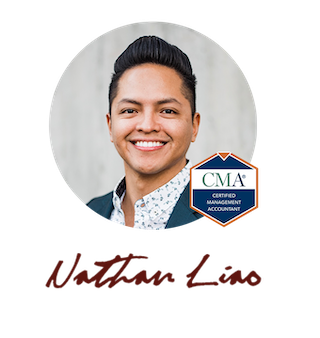On the list of dream accounting and finance jobs, VP of finance is close to the top. It’s one of the most coveted positions for accountants. And it’s easy to see why: great pay, a high rate of job satisfaction, and endless opportunities for advancement.
If you’re in the early stages of your career, the path to becoming a VP of finance can seem long. Let me ease your mind – throughout my career, I’ve seen professionals reach that goal earlier than expected. They just had to find out exactly which steps to take to get them there quickly.
I’ll let you in on all the secrets. Keep reading to learn each step you need to take to become a VP of finance.
In this article:
- VP of Finance Education Requirements
- VP of Finance Skills
- VP of Finance Responsibilities
- VP of Finance Salary
- Becoming a VP of Finance
- Land Your Dream Job With CMA Exam Academy
VP of Finance Education Requirements
At a minimum, hiring managers will expect all VP of finance candidates to have an undergraduate degree in finance or accounting.
That said, there’s a lot of competition for these roles. It won’t be easy to stand out from other candidates with an undergraduate degree alone.
In addition to the sophisticated level of accounting or finance knowledge one may gain from an undergraduate degree, professionals will need to know advanced management techniques. For this reason, serious candidates should consider taking their education a step further.
Two popular options are graduate studies – earning an MBA, for example – and professional certifications.
While an MBA will look good on a resume, these students don’t typically learn skills specific to management and professional leadership roles.
My recommendation is the CMA. While still a highly respected certification, the CMA is considerably more affordable and accessible than an MBA. It looks great on a resume, and with the right study tools, you can complete it in under a year.
VP of Finance Skills
Throughout your journey to becoming a VP of finance, you’ll need to stay focused on your goal to get there quickly.
Here are some skills to focus on:
- Leadership: a VP of finance is a leader in an organization. All candidates will need to demonstrate concrete evidence of leadership skills such as communication and conflict resolution.
- Data analysis: as a VP of finance, you’ll be responsible for financial planning to improve profits and help a company achieve its goals. This will require exceptional analytical skills.
- Strategy and projection: as a member of the company’s leadership team, a VP of finance will need to demonstrate organization and critical thinking abilities. Establishing your experience with forecasting and planning will be vital in defining your competencies.
These skills are in addition to a foundation of accounting knowledge that only years of real-world job experience can help you develop. The recommended amount of experience for accountants who want to become a VP of finance is between 5 and 10 years, 3 to 5 of which should be in a managerial role.
It may seem like a long time, but it will be worth it when you land that corner office. So roll up your sleeves and get to work.
VP of Finance Responsibilities
I won’t sugarcoat it: VPs of finance are seasoned pros. They have a long list of responsibilities, and a lot is expected of them.
These professionals are leaders within their companies. They’re high up on the ladder, like corporate controllers and CFOs.
Some of their responsibilities include:
- Developing and directing a company’s financial plans
- Overseeing the work of all accounting teams
- Strategic planning and policy design
- Forecasting and decisionmaking
As a VP of finance, you’ll be expected to know more about a company’s finances than almost anyone else on the team. The level of responsibility is significant, so make sure you’re ready for it before beginning the application process.
VP of Finance Salary
So, we’ve established that a VP of finance has a lot of responsibilities. Now you want to know how that translates to salary.
The average VP of finance salary is $229,960, although the scale for this varies depending on your experience level and industry. On the low end, you can expect about $170,000, and on the high end, nearly $300,000.
Even on the lower end of that scale, the numbers are impressive. But to improve your chances of a higher salary, studies show that the CMA is a good investment. With an income as much as 58% higher than noncertified accountants, the certification is a great way to get closer to your dream salary.
Want to learn more? Check out my guide to CMA salaries around the world.
Becoming a VP of Finance
Now that you have your sights set on your dream career, it’s time to get started.
Earn a Suitable Undergraduate Degree
I’ll be honest: I haven’t met too many VPs of finance who don’t have a bachelor’s of accounting or finance. So, if you don’t have an undergraduate degree in a related discipline, then that’s where you should begin.
Pursue Professional Certifications
If you already have your degree and a bit of work experience, you should start browsing options for upgrading your education. My recommendation is a professional certificate like the CPA or CMA.
I’m a big fan of the CMA. Not only is it affordable, but it also takes comparatively less time to complete than most of the other options. It’s a great way to show employers you’re committed to professional development.
Get the Required Work Experience
In all my years of networking with accounting professionals, I’ve never met a VP of finance with fewer than 5 years of work experience before landing their first role. It’s recommended to get up to 10 years before applying.
VPs of finance are the heads of their teams. They must possess comprehensive, well-rounded skill sets and diverse experiences that enable them to face the most complex problems troubling their organizations. That kind of expertise only comes with years of hard-earned experience.
A few roles you should be pursuing to get that experience:
- Junior or staff accountant: everyone has to start somewhere. Finding your footing as a staff accountant, auditor, or other entry-level accounting position will help you develop an understanding of the basics. This will enable you to take on the managerial positions required to become a VP of finance.
- Senior accountant or accounting manager: becoming a senior accountant or manager at your organization will prepare you for a leadership position. It’s a necessary step toward your dream job.
- Assistant CFO: CFOs and VPs of finance have similar responsibilities, so getting familiar with the roles required of an assistant CFO will help your resume stand out in a crowd.
- CFO or corporate controller: finally, we have the big ones. Professionals who hold these positions have a wealth of skills and qualifications that enable them to fulfill the duties of a VP of finance. These positions will give you direct experience to seriously impress hiring managers.
Business Networking
If you have your bachelors, a certification, or have been working in the accounting field, then I don’t need to tell you how helpful networking can be.
Connecting with other accounting professionals offers valuable insights and potential opportunities. Attend networking events, conferences, and engage on online platforms to build new relationships and gain industry knowledge.
Land Your Dream Job With CMA Exam Academy
Becoming a VP of finance is no easy feat. But if you’ve made it this far in the article, you must be serious about your goals.
That determination will get you where you want to go. You just need a good sense of direction.
I’ve worked with thousands of accountants, and I’ve found one path to be universally beneficial.
If you’re serious about leveling up your finance or accounting career, I recommend the CMA. It’s one of the most affordable, reputable, and accessible ways to stand out in the crowded job market.
Yes, passing the exam is a challenge. The global pass rate is under 50%. But that’s a major reason why the certification is synonymous with hard work and excellence.
And with the right prep, you can beat the odds.
I designed my CMA 16-Week Accelerator program to provide all the support you need to pass the exam on the first try. The numbers speak for themselves. My students have a pass rate that is nearly double the global average.
If I can leave you with one final piece of advice, it’d be not to let the exam process intimidate you. Earning a CMA can unlock the future you’ve always dreamed of, and with the right support behind you, it’s easier than you may think.

Hi, I’m Nathan Liao (aka the CMA Coach)! For the last 10 years, over 82,000 accounting and finance pros came knocking at my door seeking guidance and help. If you’re also aiming to conquer the CMA exam on your very first try—without wasting away time or money—you’ve found your ultimate guide. Dive in deeper to discover more about me and the dedicated team that powers CMA Exam Academy. Click here and let’s embark on this journey together!


